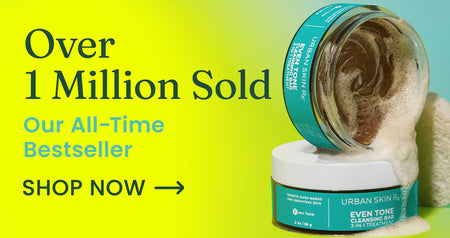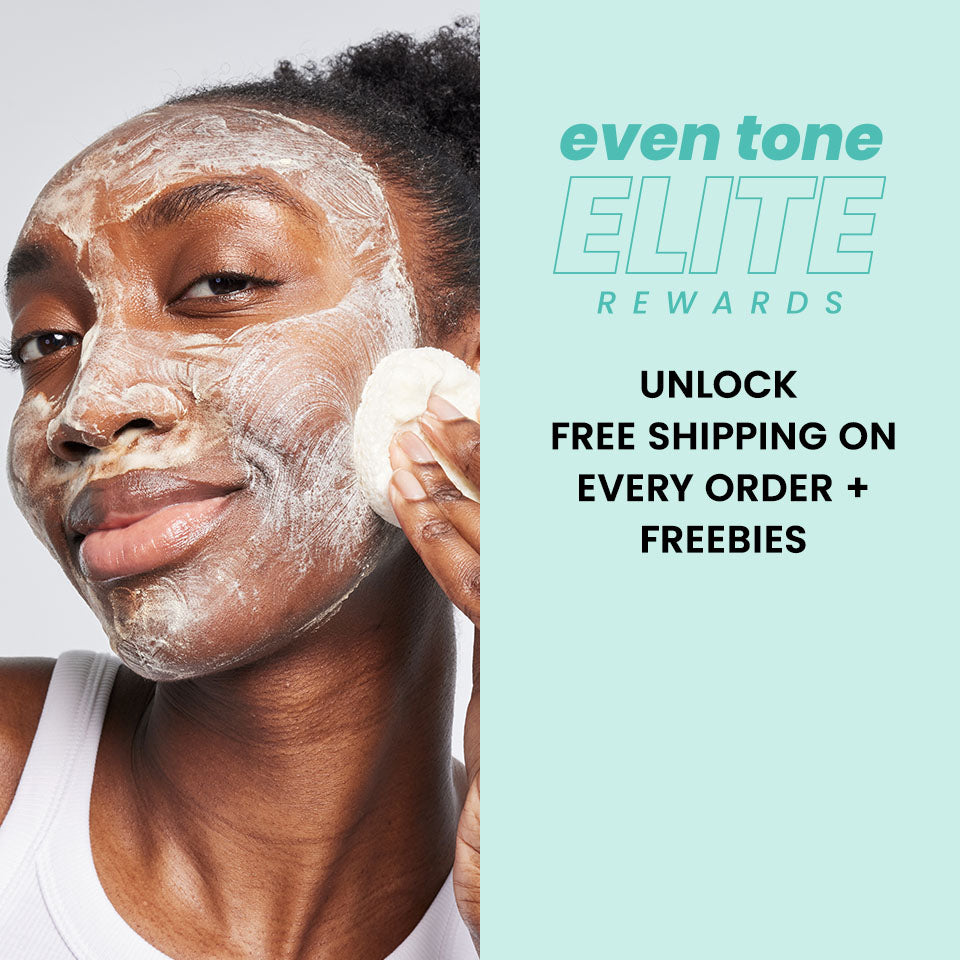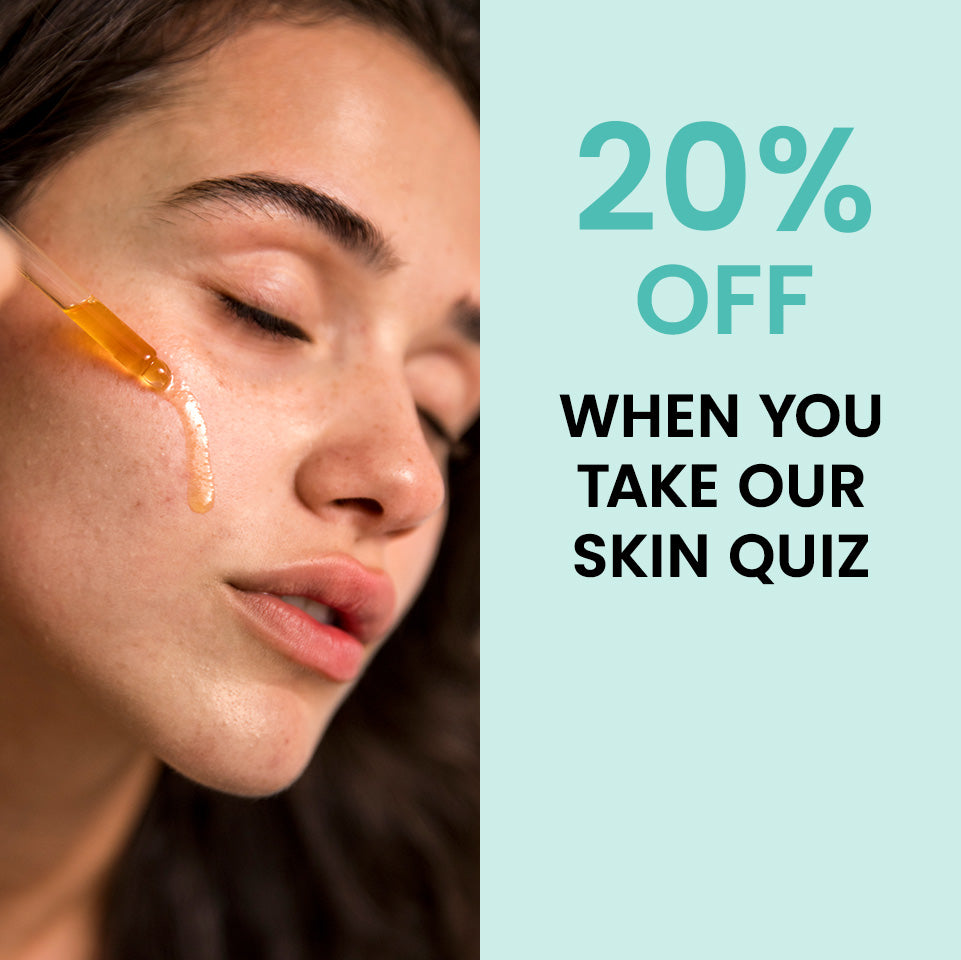Can Vitamin C Improve the Look of Dark Spots?

If you have dark spots, chances are you've stumbled upon Vitamin C before. This ingredient is popular in trending skincare, and for a good reason.
Vitamin C is incredibly effective at brightening the appearance of your skin and supporting overall skin hydration — but can it improve the look of your dark spots? Read on for the breakdown on Vitamin C and how it can help your skin.
What Is Vitamin C?
Vitamin C is a nutrient most famous for its presence in everyone's favorite breakfast beverage, orange juice. However, Vitamin C is also present in other dietary sources like supplements, broccoli, strawberries and bell peppers.
In your normal body function, Vitamin C plays a huge role in bone development and blood vessel maintenance. In your skin, Vitamin C helps support and reinforce the skin barrier.
Your body flushes any unused Vitamin C out of your system at the end of the day. That's why it's so important to constantly replenish your supply of Vitamin C.
A quick way to ensure quick and effective results for your skin is to apply Vitamin C topically. Topical Vitamin C comes in many formulas, but the most common is Ascorbic Acid.
What Are Dark Spots?
Dark spots are a type of hyperpigmentation that often present as small spots or blotches that are darker than the surrounding skin. While dark spots are more common in those with melanin-rich skin tones, they can occur in any skin tone and skin type.
At their source, dark spots are a stress response that your skin cells use to protect themselves against damage. When your cells are damaged, they react by ramping up melanin production. This is why sun exposure results in tan skin and why some blemishes can leave dark and prominent scars. Here are a few factors that can trigger this response in your skin.
Environmental Stress
The environment is full of skin stressors and dark spot triggers. Sometimes, just going outside is enough for your skin to break out in spots.
There are a few contributing factors. First, some environments are heavily polluted with smoke and other air pollutants. This pollution can enter your skin and cause damage, resulting in dark spots.
Another environmental stressor is temperature extremes. Super hot and super cold air can both have drying effects on the skin. Since dry skin is not as resilient against stress, temperature extremes can create the perfect recipe for dark spots.
One of the biggest environmental contributors to dark spots is sun damage. We're exposed to UV radiation every day, even through windows. This radiation can get into our skin cells and cause damage, which can lead to dark spots.
Wounds and Breakouts
Severe breakouts and minor wounds (even bug bites) can also lead to hyperpigmentation. Both breakouts and wounds are forms of trauma, which is a huge skin stressor.
While both can lead to dark spots, breakouts can lead to a special form of hyperpigmentation called post-inflammatory hyperpigmentation (PIH). PIH usually takes the form of dark spots that linger long after blemishes and redness are gone.
PIH can sometimes look like scarring, but the main difference is that PIH typically goes away with time. In some skin tones, PIH can look very similar to breakouts, which can be a source of frustration for some who struggle with it.
Skincare Products
Although we think of skincare products as the solution to skin issues like dark spots, the wrong skincare products can irritate your skin and trigger melanin overload. This is especially true if you have sensitive skin.
Vitamin C often doesn't trigger this reaction because it's fairly skin-friendly, but more powerful ingredients like Retinoids, Alpha Hydroxy Acids (AHAs) and Beta Hydroxy Acids (BHAs) may irritate sensitive skin.'
These ingredients can shock even normal skin for the first few uses, and it's natural to see a small bit of irritation with these ingredients as your skin adjusts. Unfortunately, this means that you might experience a few extra dark spots on your way to clearer-looking skin.
Can Vitamin C Help Improve the Appearance Dark Spots?
You may have noticed that Vitamin C is often marketed as a dark spot rescue ingredient. If you haven't tried it for yourself, we're here to officially say that Vitamin C can help minimize the appearance of dark spots. Here are a few ways that this ingredient works to clear up your complexion.
Fade the Look of Excess Pigment
To get a little technical, tyrosinase is the enzyme in your skin cells that triggers the whole melanin production process. Just one word from this little guy and dark spots can show up overnight.'
Vitamin C can help reduce the appearance of current dark spots caused by this process. While over-the-counter (OTC) skincare products typically can't truly fade dark spots, especially the deep ones, they can significantly improve the appearance of said dark spots.
One of the main reasons Vitamin C can improve the look of dark spots is that, unlike some other skin-brightening ingredients, Vitamin C is suitable even for sensitive skin in lower concentrations.
Since skincare products are a known trigger for dark spots, we recommend starting with Vitamin C to help avoid triggering dark spots and adding in stronger ingredients as your skin adjusts.
Antioxidant Properties
Vitamin C is a powerful antioxidant, which means it can help minimize free radical damage.'
Free radicals are unstable atoms that can cause skin damage in their quest for stability. As you now know, skin damage can trigger dark spots.'
Antioxidants like Vitamin C track down and neutralize free radicals, thus minimizing the damage to your skin. While free radicals can come from pretty much anywhere, UV radiation is a major culprit in free radical exposure.
Sunlight can cause free radical damage, which is why it's so important to wear sunscreen. While Vitamin C can't replace your daily SPF, it can help provide an additional layer of protection.
Supports Skin Barrier
Vitamin C also helps support the skin barrier. Your skin barrier is called the stratum corneum, and it sits on the very top of your skin.
This layer of skin has two very important jobs. First, it keeps hydration inside your skin. Second, it keeps pollutants and bacteria out of your body.
Hydrated skin is more resilient to stress, which means that Vitamin C can help give your skin what it needs to make it through stressful events without triggering dark spots. Additionally, Vitamin C can help reinforce your body's ability to keep out potential aggressors like acne-causing bacteria.
How Can I Use Vitamin C for Dark Spots?
If you have dark spots, we have good news. You can use regular cosmetic and over-the-counter (OTC) skincare products to improve the appearance of your complexion.'
What's more, we're your one-stop shop for everything you'll need to embrace even-looking skin. Here is a step-by-step skincare routine that our Licensed Aestheticians put together to help you fight dark spots.
Step One: Cleanse
Cleansing should always be the first step in your skincare routine because it can remove impurities that can build up throughout the day. Without cleansing, this buildup could block the other products in your routine from doing their job.
Luckily, we made a super effective cleanser just for hyperpigmented skin. Our Even Tone Cleansing Bar is a cleanser, a mask, and an exfoliant all in one for normal skin. Talk about multi-tasking! Don't have normal skin? No problem! We have three other cleansing bars for other skin types for you to choose from.'
Step Two: Tone
After you cleanse, we recommend applying a toner. This step is optional, but sometimes a toner can be the missing link in a targeted skincare routine.
Toners are water-based products that help hydrate and nourish the skin. They can also help prepare your skin to soak up the other products you'll use afterward.
We may be biased, but our favorite facial toner is our Witch Hazel Brightening & pH Balancing Toner. This toner uses Witch Hazel, Turmeric, Niacinamide and Licorice Root to help gently improve the appearance of dark spots.
Step Three: Vitamin C Serum
Next up, you'll want to apply a serum. This is where we recommend incorporating Vitamin C since serums are potent skincare products.
Serums are water or oil-based products that are designed to penetrate your skin barrier to infuse ingredients into your skin. Serums are designed to soak up fast and dry quickly and often feature concentrated ingredients. The idea is that the more concentrated the formula is, the more likely you are to see results.
One of our favorite Vitamin C serums is our Super C Brightening Serum. This serum features 20% Ascorbic Acid, which is the maximum amount of Vitamin C available in cosmetic formulas. Our formula also includes 2% Kojic Acid and Ferulic Acid to help brighten the appearance of dark spots and bring radiance to your overall complexion.
Step Four: Moisturize
Moisturizing is another important step in your skincare routine. The right moisturizer can flood your skin with hydration and nutrients, which can improve the appearance of your complexion and help support skin health.
Dry and dehydrated skin is much less resilient and can react much more easily to sources of stress. Using a daily moisturizer can give your skin what it needs to adapt to change without needing to overproduce melanin.
Our favorite moisturizer for an even-toned complexion is our Radiant & Bright Glowing Moisturizer. This moisturizer features THD Ascorbate, which is an extra-potent form of Vitamin C, as well as Hyaluronic Acid and Vitamin E for skin hydration.
Step Five: Apply SPF
Finally, your morning routine should always end with sunscreen. Your skin is exposed to the sun every day, even on days when you're just inside. It may not feel like it, but sun exposure through windows can cause premature skin aging. And it can also make your dark spots darker!
To avoid premature crow's feet and laugh lines, we recommend applying sunscreen with at least SPF 30 daily. This is the amount that experts agree provides the minimum coverage to keep your skin safe.
We've got just the product. Our Complexion Protection Moisturizer With SPF 30 blends chemical and mineral sunscreen technologies to create a non-irritating and lightweight formula that can protect your skin against sun exposure — and hydrate at the same time.
In Conclusion
Vitamin C is an important skincare ingredient for your overall skin health. This ingredient is particularly good at minimizing the appearance of dark spots because of its antioxidant properties.
We've recommended a few products to help tackle dark spots, but if you want more personalized advice, take our skin quiz or schedule a virtual consultation with one of our Licensed Aestheticians. Let us help you start your skincare journey.
Engagement Manager







